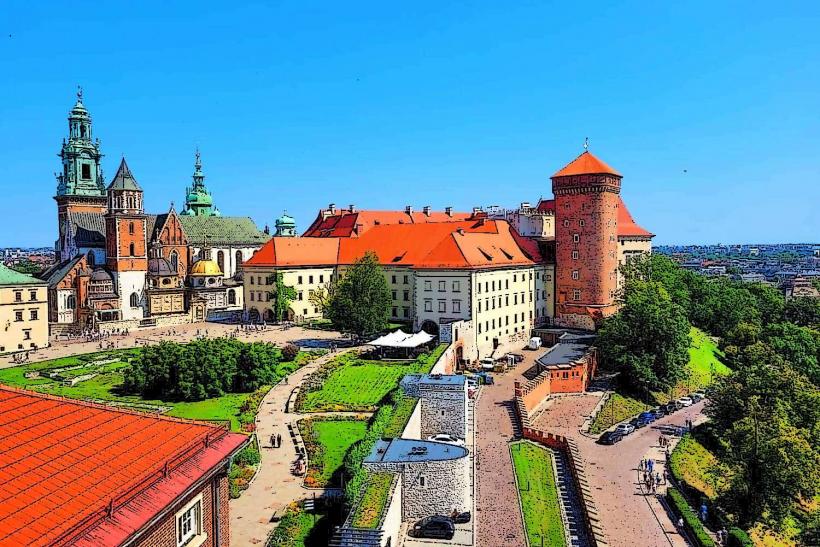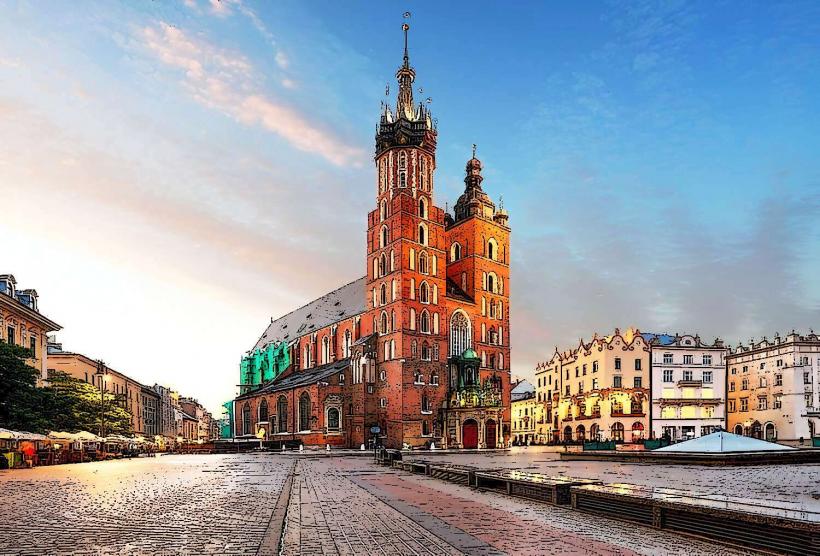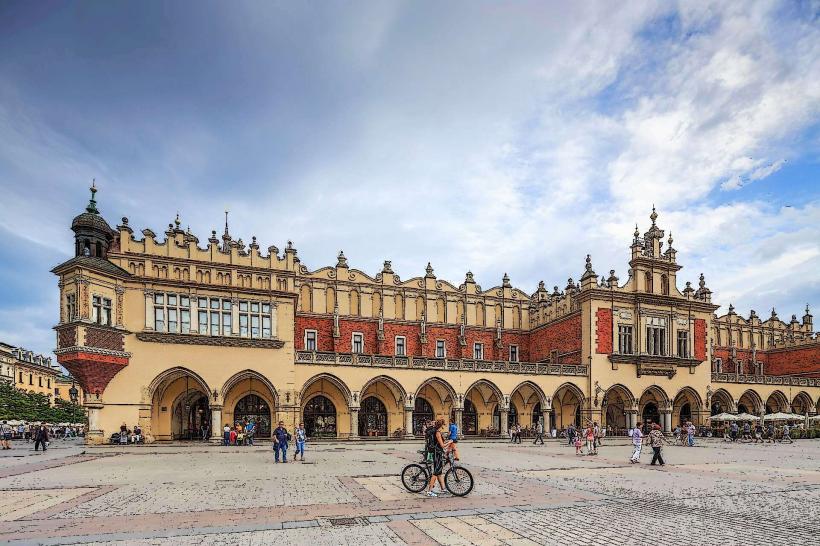Information
City: KrakowCountry: Poland
Continent: Europe
Kraków, often regarded as Poland’s cultural capital, is one of the country’s oldest and most beautiful cities. Located in southern Poland on the Vistula River, Kraków has been a prominent center of Polish culture, history, and intellectual life for centuries. It offers a fascinating blend of medieval, Renaissance, and modern architecture, alongside a vibrant social and cultural scene.
History
Kraków’s history dates back over a thousand years, and it has played a key role in Poland’s development. It served as the capital of Poland until 1596, when Warsaw became the capital. The city was a political and cultural hub of the Polish kingdom, home to royalty and the church. It was here that Poland's first university, the Jagiellonian University, was founded in 1364, making Kraków a center for learning and scholarship in Europe.
In the 20th century, Kraków became a symbol of Polish resilience, especially during World War II when it was occupied by Nazi Germany. The nearby Auschwitz-Birkenau concentration camp remains one of the most important historical sites in the world. After the war, the city emerged as a key site for the revival of Polish cultural and intellectual life under communist rule and has since become one of Poland’s most important cities.
Geography and Layout
Kraków is located on the Vistula River in the region of Lesser Poland. The city is known for its well-preserved medieval Old Town, which is one of the largest in Europe and was designated a UNESCO World Heritage site in 1978. The Old Town is centered around the Main Market Square (Rynek Główny), which is surrounded by historic buildings, churches, and merchant houses. The Wawel Hill area, home to the Wawel Castle and Cathedral, is another iconic part of the city.
Kraków’s urban layout has a mix of narrow medieval streets and wide avenues lined with trees and parks. The city is divided into several districts, with the central ones being the Old Town, Kazimierz (the historic Jewish quarter), and Nowa Huta, a socialist-era district that is still a distinctive part of the city’s landscape.
Economy
Kraków is one of Poland’s economic powerhouses, with a diversified economy driven by sectors such as technology, finance, tourism, education, and manufacturing. The city has become a leading hub for the IT and business services industries, with many multinational companies opening offices in the city. Kraków is also home to a thriving creative industry, including film, music, and arts.
Tourism is one of the city’s most important industries. The historic sites, museums, theaters, and cultural festivals attract millions of visitors each year. Kraków's proximity to the Tatra Mountains, as well as its rich cultural life, make it a popular destination for both domestic and international tourists.
Education and Research
Kraków has long been a center of learning and intellectual activity. The Jagiellonian University, founded in 1364, is one of the oldest universities in Europe and remains a leading academic institution. The city is also home to many other universities and research institutions, making it a center for innovation and higher education.
Kraków’s educational institutions have contributed significantly to various fields, including science, literature, art, and law. The city’s intellectual atmosphere is further enhanced by a large student population, with thousands of young people coming to Kraków to study each year.
Culture
Kraków’s cultural heritage is unmatched in Poland. The city has a rich tradition of literature, music, art, and theater, and it is often referred to as the cultural capital of Poland. Many prominent Polish writers, including Nobel Prize laureates such as Wisława Szymborska and Czesław Miłosz, have ties to the city.
Kraków is known for its many cultural festivals, such as the Kraków Film Festival, the Jewish Culture Festival in Kazimierz, and the annual Festival of Sacred Music. The city is also home to world-class museums, including the National Museum, the Museum of Contemporary Art, and the Czartoryski Museum, which houses Leonardo da Vinci’s famous painting Lady with an Ermine.
The city’s music scene is thriving, with numerous classical music concerts, jazz performances, and opera shows throughout the year. The Kraków Philharmonic, the Kraków Opera, and the Jewish Culture Festival are just a few of the major cultural events that bring together audiences from all over the world.
Public Transport and Infrastructure
Kraków boasts an efficient and modern public transportation system that includes buses, trams, and a growing network of bike lanes. The city is also easily accessible by car, and it has good connections to other parts of Poland and Europe. Kraków’s main railway station, Kraków Główny, is one of the busiest in the country, offering connections to major cities across Poland and neighboring countries.
The city’s John Paul II International Airport, located just outside the city center, serves as the main gateway to Kraków, offering a wide range of international flights.
Green Spaces
Despite being a bustling city, Kraków is known for its beautiful green spaces. The Planty Park, which surrounds the Old Town, is one of the largest urban parks in Poland and offers a peaceful place to relax. Other notable parks include the Błonia Meadow, a large open space near the city center, and the Zakrzówek Reservoir, which is a popular spot for swimming and hiking.
The city is also home to the Tyniec Abbey, located on the outskirts of Kraków, which offers a tranquil retreat in a natural setting. The nearby Ojców National Park, with its limestone cliffs, caves, and forests, is another popular destination for nature lovers.
Modern Development and Urbanism
Kraków is undergoing significant urban development, with new commercial and residential buildings transforming parts of the city. The city is balancing modernization with the preservation of its historic character, and many new developments incorporate sustainable and eco-friendly design elements.
The city is becoming increasingly known for its tech scene and is attracting startups and tech entrepreneurs, particularly in the areas of software development, gaming, and innovation.
Social Life and Lifestyle
Kraków is renowned for its vibrant social life, particularly in the evenings. The city has a thriving café culture, with a wealth of coffee shops and bars in the Old Town and Kazimierz. The city’s nightlife is also famous, with a variety of pubs, clubs, and music venues catering to all tastes.
The city is a major center for Polish cuisine, with restaurants serving everything from traditional pierogi and Polish soups to contemporary fusion dishes. The Jewish quarter, Kazimierz, is particularly known for its excellent restaurants, many of which serve kosher food.
Challenges
Kraków faces challenges typical of a rapidly growing urban center. Issues such as air pollution, traffic congestion, and the pressures of mass tourism can sometimes affect the city’s quality of life. However, Kraków is working to address these problems through various initiatives, including promoting public transport and sustainable urban planning.
Future Outlook
Kraków is expected to continue growing and evolving in the coming years. The city is increasingly becoming a regional hub for innovation and technology, while also maintaining its status as a cultural and historical center. Efforts to preserve its heritage while embracing modernity will ensure that Kraków remains a dynamic and fascinating city for generations to come.




